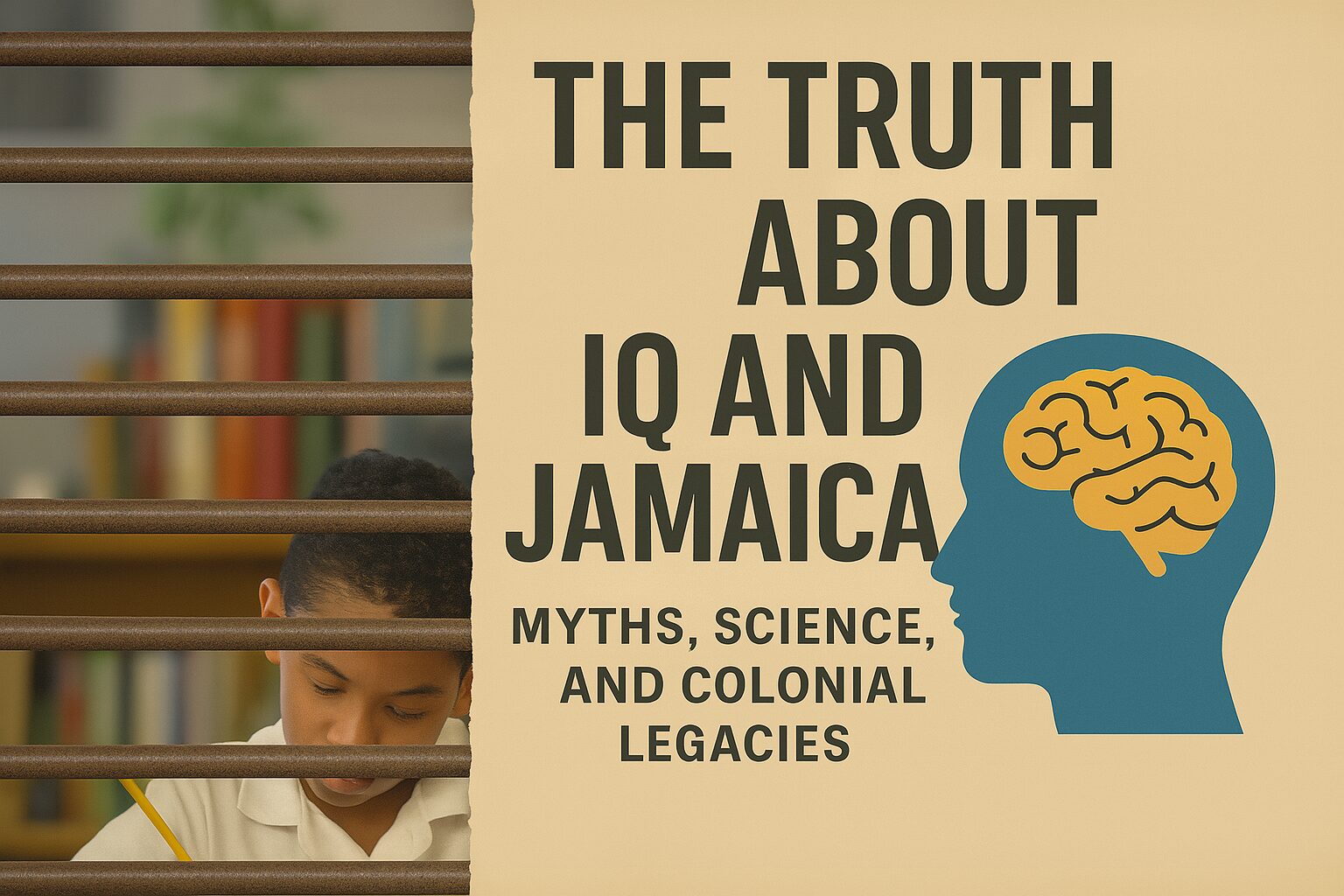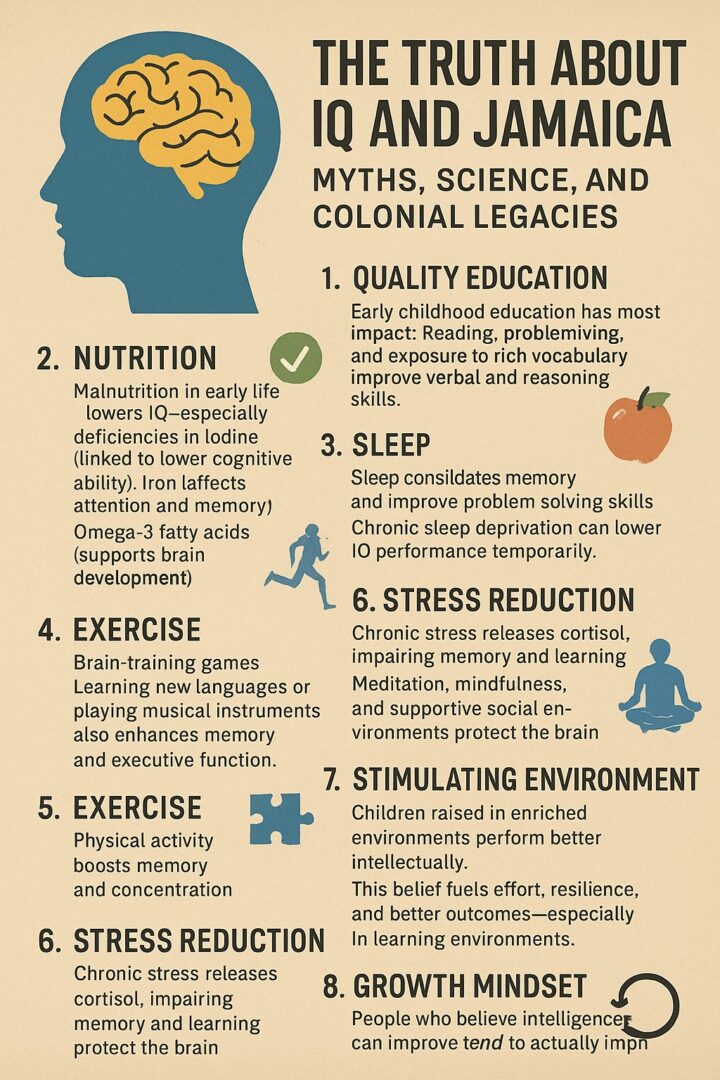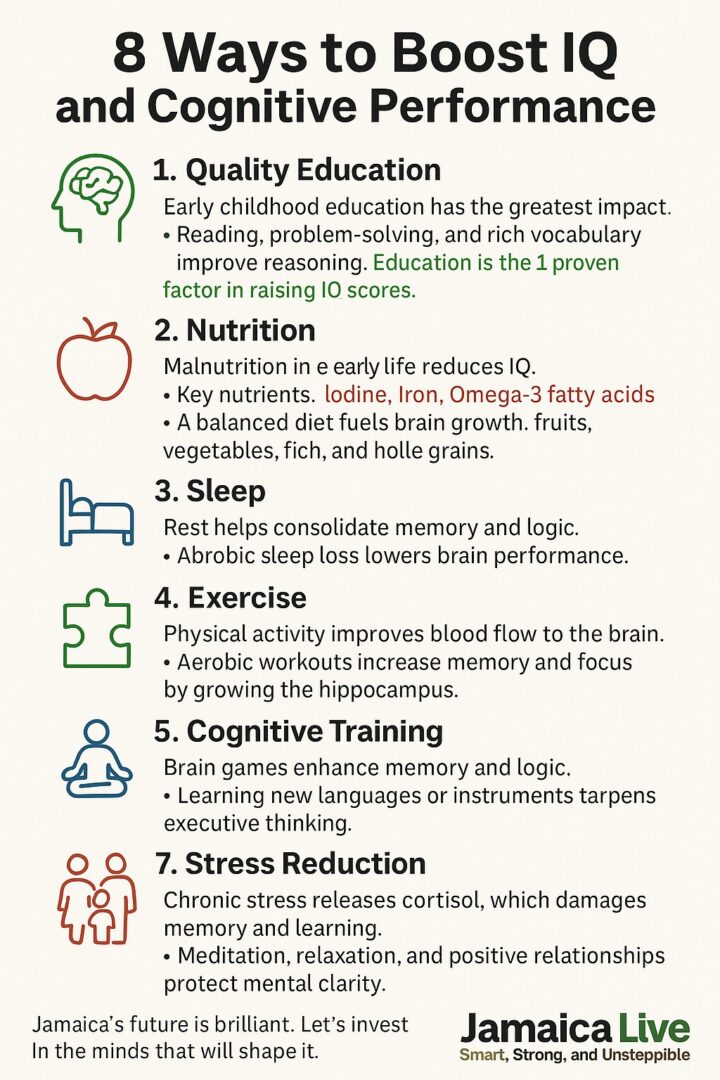The Truth About IQ and Jamaica: Myths, Science, and Colonial Legacies
By Jamaica Live News
In recent years, Jamaica has occasionally appeared in global IQ rankings with controversial claims that the country’s average intelligence quotient (IQ) is significantly lower than the global norm. Some reports—particularly those derived from the book IQ and the Wealth of Nations by Richard Lynn—have cited Jamaican IQ scores as low as 67 to 72.
An individual with an IQ score of 70 to 75 or below is classified as having an intellectual disability.

Is superstition a factor?
Superstition is not a direct contributor to low IQ. However, in communities where superstition supplants scientific education—often due to a scarcity of resources or the aftermath of colonialism—it may be indicative of inadequately funded educational systems, rather than the fundamental cause of diminished test performance.
Nonetheless, if an individual being assessed responds to a query with a religious or superstitious belief, the outcome may be influenced by their IQ test results.
Critical Thinking Skills can influence IQ—especially how well someone performs on problem-solving and reasoning tasks. While IQ measures general intelligence, critical thinking sharpens how we apply that intelligence.
What’s the Difference?
Critical thinking is the ability to analyze information objectively, question assumptions, and make reasoned judgments. Developing critical thinking skills through education, debate, and analysis can boost cognitive performance and even improve IQ test scores over time.
IQ (Intelligence Quotient) measures general cognitive abilities like reasoning, memory, and problem-solving speed.
But what’s the truth behind these numbers? And why should we be extremely cautious when interpreting them?

The Dubious Science Behind the Scores
The IQ statistics most commonly cited about Jamaica are based on outdated, methodologically flawed, and culturally biased studies. The most referenced data was gathered in the 1960s from schoolchildren, during a period when access to quality education, nutrition, and healthcare in Jamaica was still heavily impacted by colonial underdevelopment.
Key problems with these studies include:
- Small, unrepresentative sample sizes
- Tests developed in Western countries and not adapted for Caribbean cultures
- Neglect of socioeconomic and environmental factors like poverty, malnutrition, and trauma
- Biases of the researchers, particularly Richard Lynn, whose work has been widely discredited for links to eugenics and white supremacist ideologies
In short, these IQ rankings say far more about the biases of the testers than the intelligence of the tested.
🧠 What Actually Influences IQ?
IQ, or intelligence quotient, is not simply a fixed number one is born with. It is shaped by environmental, educational, nutritional, and emotional factors, particularly during childhood development.
Factors that affect IQ:
- Early childhood education
- Nutrition (especially iron, iodine, and omega-3s)
- Health care access
- Emotional security and parental support
- Exposure to language and books
- Freedom from chronic stress and violence
What About Genetics?
Yes, genetics play a role—but environment, education, and health can significantly amplify or limit that potential.
These are not just individual issues—they are systemic, tied to the legacies of colonization, underfunded education systems, and inequitable development.

🏛️ Colonial Legacies and the Weaponization of IQ
IQ tests were historically used to justify social hierarchies, particularly during the height of colonialism and segregation. In the early 20th century, eugenics movements used IQ tests to label African-descended populations as inferior and unfit for leadership, education, or self-governance.
Many of the same narratives are still at play today—framing low test scores as inherent deficits rather than outcomes of systemic disadvantage.
Let’s be clear: low test scores do not mean low potential. They often mean unequal opportunity.
🌍 The Flynn Effect: IQs Are Rising Globally
Psychologists have observed a phenomenon known as the Flynn Effect—a steady increase in average IQ scores across the world, especially in developing countries. The reason? Better education, improved nutrition, cleaner environments, and more exposure to information.
Jamaica is no exception. With expanded access to schooling, government investment in early childhood development, and cultural pride in academic achievement, there is every reason to believe IQ scores—if fairly tested—would reflect rising cognitive performance.
🎓 Jamaica’s Real Intelligence: Creativity, Innovation, and Resilience
Even beyond IQ scores, Jamaica has proven its brilliance to the world:
- Marcus Garvey – Philosopher and global pan-African leader
- Usain Bolt & Shelly-Ann Fraser-Pryce – Global sports icons with sharp business minds
- Hedley Jones – Pioneer of the electric guitar and sound system engineering
- Professor Gerald Lalor – Renowned scientist in chemistry and environmental science
- Countless doctors, engineers, artists, and scholars at home and abroad
Jamaican intelligence doesn’t always wear a lab coat—it often comes with rhythm, resistance, and revolutionary thinking. Jamaica has produced world-class intellectuals, scientists, writers, musicians, and athletes, often with far fewer resources than their counterparts in wealthy nations. Intelligence cannot be measured by a single number, and certainly not by tests created in colonial contexts.
To judge an entire population’s intelligence based on flawed, biased, or outdated testing is not only scientifically unsound—but also ethically dangerous.
🔍 Final Thoughts: Beyond the Numbers
It’s time to reject the flawed science and colonial ideologies that try to define intelligence through narrow, Western-centric metrics. Jamaica is a nation of thinkers, builders, creators, and leaders. Intelligence is not just what can be measured on a test—it’s how we solve problems, uplift our communities, and shape the world.
So the next time someone quotes a low IQ statistic for Jamaica, remember this: the test is outdated, the measure is biased, and the truth about Jamaican brilliance is far too big to fit on a single scorecard.
🟩 Jamaica Live News | Unapologetically Caribbean. Unapologetically Intelligent.

This article can try its best to debunk the low IQ ranking of Jamaica, but all you have to do is talk to one of them and you’ll know the low IQ reports are gospel.